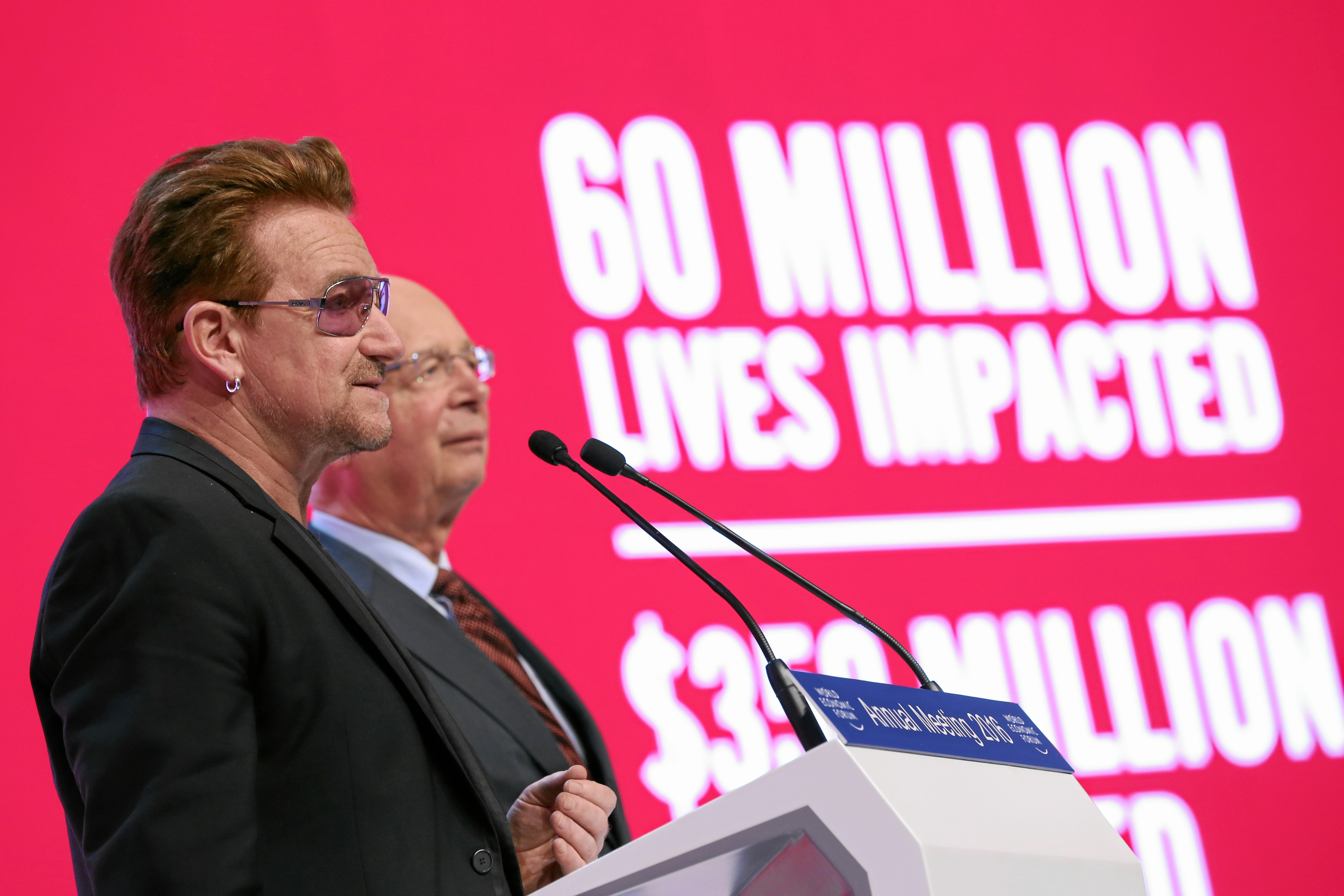“The First Industrial Revolution used water and steam power to mechanize production. The Second used electric power to create mass production. The Third used electronics and information technology to automate production. Now a Fourth Industrial Revolution is building on the Third, the digital revolution that has been occurring since the middle of the last century. It is characterized by a fusion of technologies that is blurring the lines between the physical, digital, and biological spheres.”
Klaus Schwab, Founder and Executive Chairman, World Economic Forum, 14 Jan 2016
∆
Soon after his November 2018 video conference, Assange’s internet connection was cut and all communications ceased. After six months in limbo, he was dragged from the embassy by British police, and found guilty that same day of breaching the Bail Act nearly seven years previously. On 1st May he was sentenced to fifty weeks in Belmarsh Prison — but because of cynically drawn-out extradition procedures to face charges brought against him under the Espionage Act in the US, he is still there, in solitary confinement, more than four months after he should have been released.
So his warnings about AI were pretty much the last words he has had the opportunity to address to us. Apart, that is, from what he was calling out in a clear, strong voice to a few witnesses in the street as UK police dragged him at dawn from the embassy. One witness captured the scene on his mobile phone.
“They must resist! UK, resist! Resist this attempt by the Trump administration… [inaudible, as they stuff him into the waiting minibus and a policewoman interposes herself and speaks to the citizen journalist] “UK must resist! They must resist!”

‘UK, resist! They must resist!’
Less than a year later, we were all given a taste of what it’s like to be under arbitrary detention — and meekly accepted it.
∆
It would just be for a few weeks, we were told.
But as the weeks stretched into months, it became more and more obvious, to those whose minds were not paralysed with fear, that something else was going on; that the crisis was in fact planned and contrived — a viral marketing campaign, in effect, for invasive technologies; the manufacturing of consent for a high-speed restructuring not just of the global economy but of human society and culture.
Confirmation of these suspicions came from the horse’s mouth, as it were, with the publication in July of a 428-page book co-authored by Klaus Schwab, the founder and director of the World Economic Forum, the globalist institution that partnered with the World Health Organisation in declaring a global emergency.

“In less than a month,” crows Schwab, “from the maelstrom provoked by the staggering speed at which the pandemic engulfed most of the world, a whole new era seemed to emerge.”
Klaus Schwab, The Great Reset, p 37
Schwab is understandably happy and excited. His two previous publications anticipated the present moment — The Fourth Industrial Revolution (2016) and Shaping the Fourth Industrial Revolution (2018). His current book sets a nice capstone on the trilogy.
“The containment of the coronavirus pandemic will necessitate a global surveillance network…“
“We will see how contact tracing has an unequalled capacity and a quasi-essential place in the armoury needed to combat COVID-19, while at the same time being positioned to become an enabler of mass surveillance.”

The book admits that “… the corona crisis is (so far) one of the least deadly pandemics the world has experienced over the last 2000 years.” (p300) But according to the authors this does nothing to invalidate their argument, which is that the emergency provides an opportunity to reset all the world’s existing problems — ‘whether economic, geopolitical, societal or environmental’ — by transitioning to a centralised authoritarian technocracy. The implication is clear: that the virus is a god-send to those who want total control; that if the virus didn’t exist, they would have had to invent it.
After all, “History shows that epidemics have been the great resetter of countries’ economy and social fabric.” (50)
This time, however, it’s not about resetting one country’s economy. Global problems require global solutions.
“A vacuum of global governance and the rise of various forms of nationalism make it more difficult to deal with the outbreak.” (128)
Luckily, however, “COVID-19 has reminded us that the biggest problems we face are global in nature.” (141)
Among the most immediate benefits of the timely pandemic, according to Schwab, is the way it “turbo-charges” the integration of robots and intelligent systems into the work-force, hastening his precious Fourth Industrial Revolution. As Schwab himself presciently noted in his 2016 hymn to 4IR, “Major technological innovations are on the brink of feeding momentous change throughout the world.”
Now, we get an eager update:
“In the four short years since, technological progress has moved impressively fast. AI is all around us, from drones and voice recognition to virtual assistants and translation software. Our mobile devices have become a permanent and integral part of our personal and professional lives, helping us on many different fronts, anticipating our needs, listening to us and locating us, even when not asked to do so…”
So kind of them — even when we don’t ask. But we will, now that it’s for our own good.
“The containment of the coronavirus pandemic will necessitate a global surveillance network…” (44)
And even more explicitly:
“It will also accentuate one of the greatest societal and individual challenges posed by technology: privacy. We will see how contact tracing has an unequalled capacity and a quasi-essential place in the armoury needed to combat COVID-19, while at the same time being positioned to become an enabler of mass surveillance.” (187)
Did you catch that? ‘Positioned’.
Positioned to become an enabler.
And that prefix: quasi-essential.
You see? Global solutions require global problems.
These hideous old Nazis.
∆
Meanwhile, let the celebration continue.
“Automation and robots are reconfiguring the way businesses operate with staggering speed and returns on a scale inconceivable just a few years ago. Innovation in genetics, with synthetic biology now on the horizon, is also exciting, paving the way for developments in healthcare that are groundbreaking […] The speed and breadth of the gains of the Fourth Industrial Revolution have been and continue to be remarkable […] the pandemic will accelerate innovation even more, catalysing technological changes already underway … and ‘turbocharging’ any digital business or the digital dimension of any business. (187)
“The process of automation was set in motion many years ago, but […] the pandemic will fast-forward the adoption of automation in the workplace and the introduction of more robots in our personal and professional lives. From the onset of the lockdowns, it became apparent that Robots and AI are a “natural” alternative when human labour was not available.” (210)
As a result, “… businesses, consumers and public authorities are now rushing to turbocharge the speed of adoption [of autonomous technologies and machine- learning]. So-called Robotic Process Automation (RPA) makes businesses more efficient by installing computer software that rivals and replaces the actions of a human worker.” (213)
And that’s why our current problems will not disappear, even as the virus, like it’s stablemate SARS, becomes host-adapted and ceases to pose a threat. It’s why we are being threatened and cajoled into accepting the new order as ‘normal’ — and why the process will continue beyond the end of the marvellous pandemic.
“In one form or another, social- and physical-distancing measures are likely to persist after the pandemic itself subsides, justifying the decision in many companies from different industries to accelerate automation…” and to “restructure the workplace in a way that minimizes close human contact. Indeed, automation technologies are particularly well suited to a world in which human beings can’t get too close to each other.” (210)
Once kick-started, the process will become self-reinforcing, driven by the economic consequences of the economic suicide of lockdown.
“In all likelihood, the recession induced by the pandemic will trigger a sharp increase in labour substitution, meaning that physical labour will be replaced by robots and ‘intelligent’ machines…” (70)
“Automation anxiety”, he notes, “is therefore set for a revival.”
I hear ya, Klaus. All those robots might make people anxious. But that’s just because people don’t always know what’s good for them.
∆
They are very confident, these hideous old Nazis. Or they project confidence, at least.
In the art of war, wrote Sun Tzu two and a half thousand years ago, one should seek to subdue the enemy through psychological means, and so win without having to fight. Appear strong when you are weak, weak when you are strong.
Gary Kasparov, probably the greatest chess player who ever lived, always maintained a high awareness of his opponent across the board, subtly observing body language and micro-expressions to gauge his emotional state.
It doesn’t work with machines, though. Kasparov was challenged to play against IBM’s Deep Blue chess engine in 1996, and won — but then lost the rematch in 1997.
In these series, there was no player across the board.
The match was hyped as ‘The Brain’s Last Stand.’ But Kasparov knows it wasn’t that. In fact it wasn’t man against machine at all. There are always humans behind the machine. When he talks about it now, he names and praises the Deep Blue team, sincerely, for their achievement. It was their intelligence — their hard work and persistence — that he was playing against.
Chess machines, let’s be clear, are not intelligent. They number-crunch the game and win by brute force, sheer memory and computational power. Deep Blue could compare millions of positions every second, and calculate the probabilities.

Even then, it only ‘won’ because Kasparov made a mistake. Machines win by being more consistent than humans. A chess machine is ‘narrow artificial intelligence’. A contradiction in terms, actually. It has no intuition, no imagination, no daring, no strategy, no thought — therefore no intelligence.
Computation is not intelligence. Even a machine can do it.
In retrospect, Kasparov believes that neither he nor the computer played well in the deciding game.
I disagree. Why? Because there was no game. No game of chess took place, either in Philadelphia or New York.
How so? A priori. Machines don’t play chess — because machines don’t play.
They are programmed to simulate, that’s all.
So, no player, no game. It was all an illusion.
Kasparov won and then lost. The machine did neither: it experienced neither victory nor defeat.
Kasparov acknowledges, correctly, that “Machines will always beat humans in a closed system.”
A game is a closed system.
A human being, however, is not.
This planet is not a closed system.
Life is not a closed system.
And that’s why, to win, first they have to close the system.



NEXT: The MERCY of MACHINES
The robot surveillance dog is exactly the model used in the new adaptation of War of the Worlds where the machines of the aliens are partially organic but linked with each other, a couple of teenagers who are intrigued and see them sympathetically, plus the Mastermind.
Interesting model huh?
Hi Paul,
Once again in awe of your research knowledge and writing.
I left a comment about the video of the robot distancing dog was identical to the one used in War of the Worlds BBC adaptation. Here is a link to a bit of it.
https://www.youtube.com/watch?v=Q6hdZMOAEzc
Great work!
Love
C.
Sent from Mail for Windows 10
Have to look for Baird Dynamics in the credits..
Yes indeed. Predictive programming…
Please look into the Russian orphanages where once a baby reached one year old, the mortality rate was very low as compared to other institutions. The Russians were quite proud. However, the orphanage in fucking Siberia of all places was different in that there was no difference in mortality rates from 1 day old to 5 years old.
In a communist system this made no sense. The food was the same, # of workers, laundry detergent, fabric of clothing, dishes, flatware, same, same, same! So a team of scientists were sent out to observe the 3 orphanages and what they found in Siberia, initially was all the same. Until one of the scientists noticed a large woman whom upon entering the nursery, scooped up several infants and set about her work balancing babies on her shoulders and hips. She took infants into the bathroom with her. She maintained constant contact the entire shift.
The infants at the other two orphanages it was determined, were being literally starved to death. Not of sustenance in the form of shelter or nutrition but rather, of human touch.
“And for them if you’re going to maintain control of people on a machine model, you need to stop them resonating with divine intelligence and resonating with living things and resonating with each other, and get every body hooked into the machine. And that’s what this is really about. ” CA Fitts